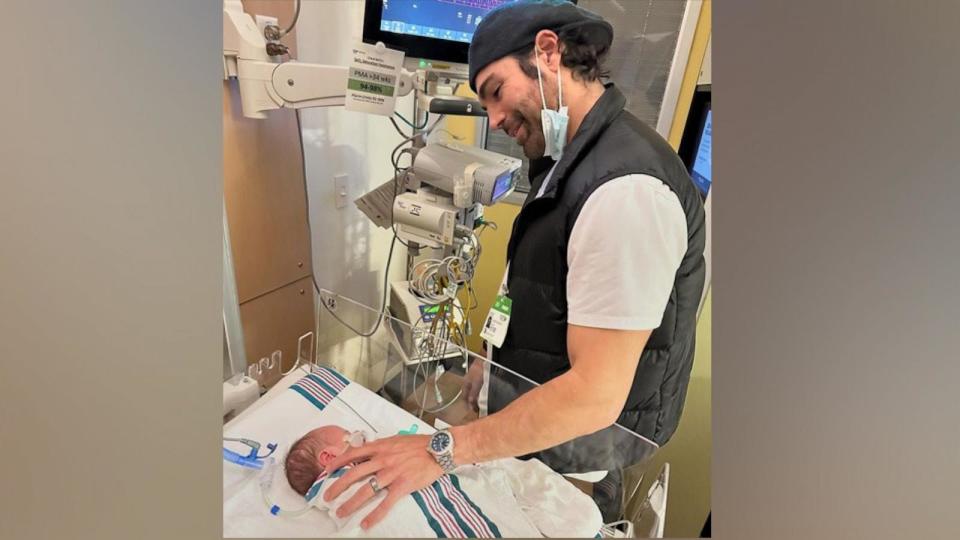Actor says newborn daughter hospitalized due to RSV
Soap opera star Jordi Vilasuso is opening up about his newborn daughter's health battle.
Vilasuso, best known for his role on "The Young and the Restless," shared in a joint Instagram post with wife Kaitlin on Thursday that his nearly 1-month-old daughter Lucy was recently diagnosed with respiratory syncytial virus, or RSV, a common respiratory virus.
After being admitted to a Los Angeles-area hospital last week with difficulty breathing, Lucy was eventually moved into the neonatal intensive care unit with a "partially-collapsed right lung," according to an update Vilasuso shared on Instagram.
"Please please pray with us for miraculous healing for Lucy's precious little body," he and his wife wrote on Instagram, alongside photos of their daughter. "We love her so much and just want her home and happy and in our arms."

Vilasuso and his wife, who are also the parents of two older daughters, shared in a later update that Lucy's health was improving, describing her lungs as showing improvement on an X-ray, but noting she still required a feeding tube and respiratory support.
"Our little Lucy is proving to be quite the little fighter," they wrote in a joint Instagram post.

The Vilasusos' openness about Lucy's experience with RSV has turned a spotlight on those most vulnerable to the virus, kids under 1 year old and seniors 65 years and older.
Children under the age of four are hospitalized with RSV more than any other age group, according to the U.S. Centers for Disease Control and Prevention.
According to CDC data, this month, at least 38 states have reported high or very high levels of respiratory illnesses, including RSV.
What to know about RSV
RSV is a contagious virus that can spread from viral respiratory droplets transferred from an infected person's cough or sneeze; from direct contact with the virus, like kissing the face of a child with RSV; or from touching surfaces like tables, doorknobs and crib rails that have the virus on them and then touching your eyes, nose or mouth before hand-washing, according to the CDC.
MORE: I'm a doctor who lost my brother to RSV. Here is what I want parents to know
People infected with RSV are usually contagious for three to eight days, but some infants can continue to spread the virus even after they stop showing symptoms for as long as four weeks, according to the CDC.
Infants and toddlers can usually recover at home with RSV unless they start to have difficulty breathing, are not eating or drinking, or appear more tired than usual, in which case parents should contact their pediatrician and/or take their child to the emergency room.
Health officials advise parents to make sure their child's vaccinations and their own are up to date, including flu shots and COVID-19 vaccines.
They say parents can help protect their kids from respiratory viruses by continuing to follow as much as possible the three Ws of the coronavirus pandemic: wear a mask, wash your hands and watch your distance.
Currently, there are no medications developed specifically to treat RSV, but there are new vaccines and medications available to help prevent the viral spread.
Pregnant women are now eligible for an RSV vaccine, known as Abrysvo, that provides antibodies to the fetus to protect against RSV. The vaccine is given to pregnant mothers in the third trimester between 32 and 36 weeks' gestational age.
If your infant is under 8 months old, they can receive a new preventive RSV shot, nirsevimab, that is designed to help fight off the virus and prevent complications from RSV. The shot, given as one dose in a child's first or second RSV season (fall through early spring), was recently recommended by the CDC for all infants younger than 8 months old and children between 8 and 19 months of age who are at increased risk for severe RSV infection.
MORE: Despite 'game-changing' new RSV shots, uptake lagged among infants, adults: Experts
If a child is older than 8 months but has a history of congenital heart disease, was born prematurely or has chronic lung disease, parents and caregivers can ask their pediatrician if the child is eligible to receive nirsevimab.
For adults over age 60, two RSV vaccines are currently available.
Actor says newborn daughter hospitalized due to RSV originally appeared on goodmorningamerica.com


